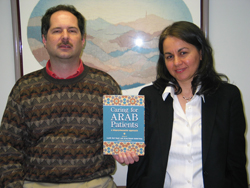 |
Husband-and-wife writing team Laeth Nasir, M.B.B.S., and Arwa Abdul-Haq, M.B.B.S., display a copy of the book, “Caring for the Arab Patient,” which the couple wrote. The book covers the social, cultural and family issues that physicians encounter when treating Arab patients. |
The book, “Caring for Arab Patients, A Biopsychosocial Approach,” is meant to help inform physicians about important aspects of treating Arab patients.
Many of the physicians practicing in Arab countries have received their training in Europe or America, which then translates into how they practice medicine, said Dr. Nasir, professor in the UNMC Department of Family Medicine.
As a result, the background culture and inherent psychosocial environment of the patient is often overlooked, he said. “Psychosocial” is a term that refers to a person’s psychological development within a particular society.
“Psychosocial dimensions of medical care exert major impacts on health and treatment outcomes,” write the authors, who are married.
“These factors can be extremely important in the diagnosis and treatment chosen by the provider and compliance on the part of the patient,” Dr. Nasir said. “Our aim was to present a framework that might help practitioners and health providers in the region provide better medical care to their patients.”
Using detailed studies conducted in 22 Arab countries, and with contributions from colleagues in countries from throughout the Middle East and the United States, Drs. Nasir and Abdul-Haq present a clear and cohesive picture of many of the psychosocial aspects of medicine encountered in Arab countries.
Subjects covered include the effects of gender on health, death and dying, family dynamics, eating disorders and substance abuse.
|
In addition, they wanted to articulate a vision that could help to shape future research in the area.
“The technology of medicine can be transferred directly from one culture to another but many psychosocial aspects of medicine cannot,” said Dr. Abdul-Haq, an adjunct associate professor in the department of pediatrics.
For example, the facts and technology surrounding problems such as death and dying or genetic counseling are the same in America and the Middle East, but the cultural and social and environment of the patient vary in different regions of the world. These differences often significantly affect the way that particular problems are approached in different world regions.
“You have to take those things into consideration when treating an Arab patient,” Dr. Abdul-Haq said.
Family has a more central role in the care of the sick, she said, and the social norms of society also have a wider impact.
“Understanding these things will help the physician present medical care in a way that the patient will be comfortable with, and might be more successful, too,” Dr. Nasir said.